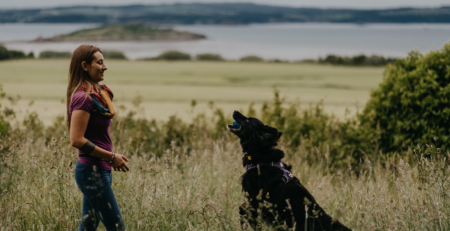Preparing your separation anxiety dog for fireworks
It’s that time of year again, the season so many pet owners dread as they prepare to pull out all the stops to protect their pets from the anxiety and even terror that many will experience at the sight, sound, and smell of fireworks!
I recommend everyone works on preparing their dog for fireworks season each year (check out the Dogs Trust’s brilliant sound therapy programme here). Even if your dog has previously been fine with fireworks, it pays to check in with them and make sure they will still take it in their stride. Age, ill health, changes in circumstance, and life events can all mean your dog may be more fearful at certain phases in their life so never take it for granted that they will be fine.
If you have a dog with separation anxiety, however, it is even more important that you prepare them and have plans in place to protect them as much as possible from the anxiety fireworks can cause.
Why is it more important to prepare separation anxiety dogs for fireworks?
- Your dog already has an anxiety disorder. This means that they are much more likely to find other stimuli anxiety inducing and to show a more extreme reaction to fireworks.
- Anxiety works at the chemical level on your dog’s brain and body. Severe stress, or repeated stressful exposures can cause long term or even permanent problems with the way your dog reacts to stressful stimuli and how well / quickly they can recover.
- If you have been working hard at your separation training, the last thing you want is to lose all that progress because your dog has panicked at fireworks.
Put simply, the fewer over-threshold experiences your separation anxiety dog has, the better and the more able they will be to progress through separation anxiety training.
How to protect your separation anxiety dog during fireworks season
It pains me to say it, because I know just how many adjustments the owners of separation anxiety dogs already make to keep their pets calm and happy. There’s no way around it though, fireworks season calls for extra care, changes to routines, changes to your home set up and even changes to medication regimens and daily walks and activities.
Here are some of the adjustments that can help your separation anxiety dog through fireworks season:
1.Plan to stay home. Since you have a separation anxiety dog you’re probably shouting at me now about exactly how many weeks and months you’ve already been staying home. But I need to say it anyway just in case. For obvious firework dates (Nov 5th and Hogmanay here in Scotland) plan to stay home throughout the day and night. If your dog has a preferred human who they feel more secure around, plan for that person to be home. If they need the whole family, get everyone to plan a night in. Be extra present for your dog.
2.Chat to your vet about meds. Yes, that’s right, meds. Not supplements, or herbal remedies. This isn’t the time to try CBD because it helped your mate’s Jack Russell chill their beans. There are tried and tested, licensed meds to help dampen your dog’s stress response and help prevent them going into full panic mode. If our dog is already on medication for their separation anxiety, you can still chat to your vet about whether another, short acting (situational) medication might help or find out if adjusting the dose of their current medication is an option. If your dog panics at the sound of fireworks, meds could stop that panic and save you and your dog a lot of distress.
3.Set up a den area well in advance & reinforce your dog for choosing it. This one thing can make all the difference. I get it, it’s a hassle and your living room isn’t that big anyway, but get creative! It is only temporary and if it prevents a training set back then it is worth it, in my opinion. Try to insulate the den area against sound and flashes of light from fireworks and spend bit of time training your dog to enjoy relaxing in there with a log lasting chew. This is a license to build a blanket fort and cosy up in it with your dog, what’s not to love (a crate will also work, if your dog likes crates)?! With a bit of planning and preparation it is even possible to hide the fact fireworks have even happened too (I’ve seen it done!).
It is common for people to put the TV on to hide fireworks sounds, but perhaps more effective is pairing the den time with something that more effectively masks sound – a white noise machine or a couple of radios playing classical/ jazz/ reggae can work wonders and become a normal part of the den routine rather than a potential cue that something is “wrong”.
4.Change your dog’s routine before bonfire night. Whatever night you are expecting fireworks, you will need to change walk times, toilet times and potentially mealtimes to ensure your dog doesn’t need to go outside after dark (at least until after midnight when it should be safer). Change can be upsetting, so gradually phase the changes in a few days before. This way your dog will be more likely to take things in her stride and be more resilient if there is an unintended exposure to fireworks. If your dog is not used to spending time on lead it is a good idea to practice this too, or invest in a long line that you can keep hold of. Sadly many a canine life has been lost after an unexpected firework has caused them to bolt.
5.Set up activities that make your dog feel good. I don’t think there is such a thing as too much enrichment for dogs. They get such a kick out of exploring, using their noses, jaws, tongues and paws that any opportunity to do this boosts wellbeing (engaging in these behaviours releases endorphins – “feel good” hormones). Scent games such as “find it”, snuffle mats, stuffed KONGS, long lasting chews, Licki mats – anything that keeps your dog relaxed and happy – are great choices both for exercising your dog at home during fireworks season and to give them emotionally positive behavioural options on firework night itself. Use your dog’s food allowance or reduce this and supplement with higher value treats if you are worried about weight!
6.Be ready to pause separation anxiety training. You can’t teach someone to swim while they are drowning, so if your dog does have some panicky/ over-threshold experiences during fireworks season, be ready to take a little time off training. A day or two may be sufficient but let them tell you when they are ready. Being left home alone when you were recently terrified for your life is a big ask, and one that most of us would not agree to. Fill training time with enrichment or fun training activities instead – boosting those happy hormones and your dog’s confidence will help them recover more quickly.
7.Remember, whatever happens it is not your dog’s fault. Panic, fear and anxiety are not behavioural choices. Your dog’s reaction to fireworks is a result of a deep and very real sense of danger. They have no way to understand what is happening and with such sensitive noses, eyes and hearing what they are perceiving is likely hundreds, if not thousands of times more intense. Please be patient and understanding with them and take time to comfort them if they “ask” for it.





